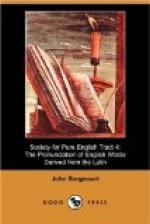The New English Dictionary, whose business it is to record facts, shows that in not a few common words there is at present much confusion and uncertainty concerning the right pronunciation. This applies mostly to the position of the stress or, as some prefer to call it, the accent, but in many cases it is true also of the quantity of the vowels. It is desirable to show that there is a principle in this matter, rules which have been naturally and unconsciously obeyed, because they harmonize with the genius of the English tongue.
For nearly three centuries from the Reformation to the Victorian era there was in this country a uniform pronunciation of Latin. It had its own definite principles, involving in some cases a disregard of the classical quantities though not of the classical stress or accent. It survives in borrowed words such as [=a]li[)a]s and st[)a]mina, in naturalized legal phrases, such as N[=i]s[=i] Prius and [=o]nus probandi, and with some few changes in the Westminster Play. This pronunciation is now out of fashion, but, since its supersession does not justify a change in the pronunciation of words which have become part of our language, it will be well to begin with a formulation of its rules.
The rule of Latin stress was observed as it obtained in the time of Quintilian. In the earliest Latin the usage had been other, the stress coming as early in the word as was possible. Down to the days of Terence and probably somewhat later the old rule still held good of quadrisyllables with the scansion of m[)u]l[)i][)e]r[)i]s or m[)u]l[)i][)e]r[=e]s, but in other words had given way to the later Quintilian rule, that all words with a long unit as penultimate had the stress on the vowel in that unit, while words of more than two syllables with a short penultimate had the stress on the antepenultimate. I say ‘unit’ because here, as in scansion, what counts is not the syllable, but the vowel plus all the consonants that come between it and the next vowel. Thus inf[’e]rnus, where the penultimate vowel is short, no less than supr[’e]mus, where it is long, has the stress on the penultima. In volucris, where the penultimate unit was short, as it was in prose and could be in verse, the stress was on the o, but when ucr made a long unit the stress comes on the u, though of course the vowel remains short. In polysyllables there was a secondary stress on the alternate vowels. Ignorance of this usage has made a present-day critic falsely accuse Shakespeare of a false quantity in the line




